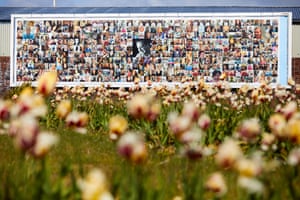The people of Barrow-in-Furness, the Cumbrian outpost that is perennially described as one of the most unhappy places in Britain and has one of the UK’s highest Covid-19 death rates, are used to negative headlines about their town.
Three months ago its council declared a poverty emergency, becoming one of the first in the country to do so, and tourists rarely visit this windy peninsula near the Lake District.
But that may soon change. A project involving Barrovians from all walks of life has produced a radical vision for its future, taking inspiration from Covent Garden in London, cooperative farms in Barcelona and the vineyards of southern France.
It may be difficult to see Barrow, situated a 45-minute drive from the nearest motorway, as one of the UK’s top tourist destinations, but that is the ambition. “It is a really bold vision,” said Sam Plum, the chief executive of Barrow-in-Furness borough council. “We’re not going to change the world overnight but it does feel like a significant moment.”
Using a GBP50,000 grant from the national lottery, Barrow’s New Constellation project brought together 15 local figures – including a police officer, a tyre fitter, a GP and a port worker – to come up with bold ideas to transform the town’s fortunes.
Their plan, which Plum said would set the council’s direction for decades to come, includes replacing car parks with playgrounds, turning backstreets into a natural park and transforming the tired town centre into a Covent Garden-style bazaar of independent businesses run by local people.
Community-run farms could help alleviate the chronic food poverty in parts of Barrow, where food bank use soared by 280% during the first national lockdown in spring. The idea for cooperative allotments is a nod to Barcelona, where locally run farms have spun off shops, and the vineyards of southern France, where many a backpacker has spent the summer picking grapes.
The challenge is huge. Deprivation in parts of Barrow is deep-rooted; people in its poorest neighbourhood live on average 11 years less than those in its wealthiest borough.
The town’s proud history of shipbuilding has left a legacy of respiratory illness, leaving older Barrovians more vulnerable to coronavirus. This in part explains why Barrow has one of the UK’s highest Covid-19 death rates, recording 168 deaths per 100,000 people within 28 days of a positive test, compared with the England average of 103 per 100,000.
The town has also had a higher than average infection rate, thought to be in part down to its preponderance of terraced housing, making up 55% of all homes in Barrow. Poverty and public-facing work are also risk factors that would leave Barrow exposed.

“Those kinds of inequalities aren’t acceptable and we’ve been trying for years to shift them,” said Plum, who took over as council chief executive 18 months ago. “There’ve been so many different government interventions, so many programmes, so many funding streams but still those inequalities and that poverty exists and, if anything, through Covid it’s been amplified.”
There are reasons for hope. Barrow is home to the UK’s largest shipyard, where BAE Systems is building the next fleet of nuclear submarines. It employs nearly 9,000 people at the site and last week announced plans to hire another 400 trainees. The area also stands to benefit from Eden Project North, which aims to open in 2024 on the other side of Morecambe Bay, with a new community hub on Walney Island in Barrow.
Tom Lowes, 21, a Barrovian who works as a technology coordinator at BAE Systems, said he hoped the vision would turn the town of 57,000 people – regularly described as England’s longest cul-de-sac because it relies on only one road in and out – as a thriving metropolitan area that could compete for tourists with the Lake District.
“I think there’s the potential of this town for it to become greener, for it to have a lot more culture, for it to bring in and retain diverse people that would want to work in the town and live here,” he said, adding: “I think we’re on the edge of the cultural rebirth of Barrow.”
Plum hopes to use a GBP25m grant from the government’s Town Fund to put some of the ideas into action, ideally within months. She knows that some of the proposals could prompt a “massive backlash”, but says town centres need huge change to survive the closure of major retailers and the climate emergency. “If we don’t start really changing the way we design our towns, so that they’re about people, we’ll never get out of it.”